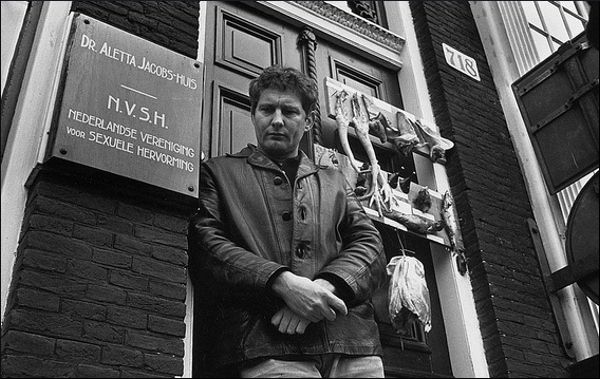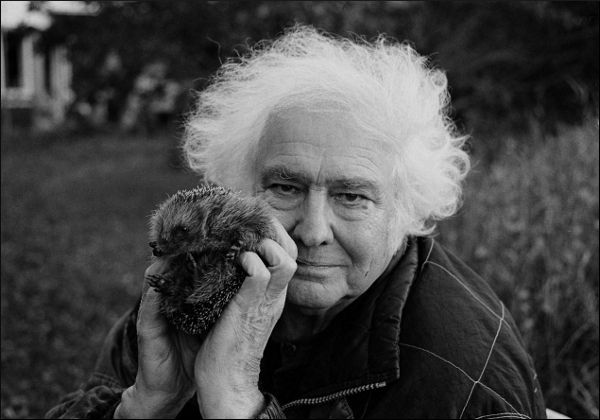
- Turkish Delight
- Published by: Meulenhoff
- Level: Intermediate
- First Published in: 1969
Two youngsters, Olga and Erik, begin a tumultuous, sexy, and passionate relationship, which slowly breaks down when Olga's mother intervenes. Jan Wolkers' novel was the source of Paul Verhoeven's famous film of the same name.

Jan Wolkers' Turks Fruit (Turkish Delight) is one of the most intensely beautiful yet obsessively warped love stories of all time, while Wolkers is one of the most renowned Dutch authors, known for the erotic content of his books. In Turks Fruit, he openly explores the mounting passion between the protagonists in all its emotional glory, and he does not shy away from taboo subjects such as obsession, possession, and jealousy, as well as the fine line between love and hate, in a way that really reveals the true personalities and feelings of the characters.
Erik picks up the hitchhiking Olga and, before they have even reached their destination, they stop for some roadside passion. Erik gets his manhood stuck in his zipper and, after a series of unfortunate events, they end up having an accident. The fact that Erik's fly is covered in blood and half-open seems a bit suspicious to the hospital staff, the police, and Olga’s parents, so they forbid her to see Erik again. However, he cannot forget the lovely Olga and he sets off to find her. And when he does, they embark on a tumultuous, passionate, roller-coaster of a relationship, and a few weeks later, they head to the altar on an old bike, true Dutch-style. Things between Erik and Olga blossom, but as is often the case, there is one major destructive factor in their relationship: Olga’s mother.
"Turks Fruit (Turkish Delight) is one of the most intensely beautiful yet obsessively warped love stories of all time."
Erik describes Olga’s mother as a “heks,” a witch who is only interested in social status and financial security, and who is therefore appalled when Olga chooses to marry a poor artist like Erik. Olga, on the other hand, learns to live with less and is proud of her impoverished cooking skills and handmade dresses, but her mother will not loosen up and keeps poisoning Olga’s mind with the dos and don’ts of marriage and life in general. Olga’s mother had a breast removed due to breast cancer – Erik repeatedly refers to her “kankertiet,” her cancer breast – and she told Olga as a child that it was her who sucked everything out of it, which leads Olga to have an intense fear of having children. The first time Erik and Olga have intercourse, she repeatedly pleads: "Maak me geen kind hoor, maak me geen kind" (Don´t make a baby, you hear, don't make a baby).

Olga and Erik live in his studio for several months, a time spent passionately love-making and going to concerts and the island of Ameland. The scenery described evokes a true sense of the Dutch countryside and lifestyle. Erik and Olga travel mainly by bike and train, and eat desserts like “muisjes,” traditional Dutch sandwich toppings similar to nonpareils. Their nights out are depicted in such a fashion that readers can actually pick up on the joys of a warm, musical, and artistic Amsterdam night. The concerts they attend are usually within walking distance, in idyllic park venues. Olga regularly poses for Erik’s sculptures and paintings, but her emotions are tested when she poses as a mother holding a baby. She holds it from her body with such fear, such coldness, and later comments: “Ik geloof dat ik enorme complexen heb. Ik weet alleen niet waar ze zitten. Daarom druk ik ze dus weg. Om er vanaf te zijn" (I believe I have intense complexes. I just don't know where they are rooted. So I push them away. So I don't have to deal with them).
"After reading it, it is impossible to go through life without wanting to be someone’s Olga one day."
When Olga's mother invites her to have dinner with her and several business associates, all hell breaks loose. Olga's mother deliberately plans the dinner in order to hook Olga up with a colleague. Olga fails to inform Erik that she will not be home in time for dinner, even though he prepared a special meal. So, growing impatient, he goes to the restaurant and finds Olga flirting with her mother’s hook-up, and the scene ends with projectile vomiting, a punch in the face, and Olga and Erik splitting soon afterwards. She moves on, marrying an American and travelling for a while, and when she sees Erik again, after her second marriage, she has changed a lot. No longer the all-natural, voluptuous girl from before, she is now full of make-up and polished nails, and has dyed her beautiful red hair blond. The next time they meet is in the Bijenkorf shopping centre. After Olga passes out in a bathroom, Erik takes her to a hospital, where she is diagnosed with a brain tumor, and from there, the story becomes even more tragic and bittersweet.
The entire book is narrated by Erik as he reminisces about his time with Olga. It begins with him lying on his bed, fantasizing about her, replaying several moments from the past, as much as she hurt him, as much as she frustrated him. "Olga, met al die vreemde, gekke, lastige, lieve en wilde dingen. Wat ben ik tog als een gek van haar blijven houden" (Olga, with all her strange, crazy, annoying, sweet, and wild things. How I kept loving her like a madman). Jan Wolkers uses straightforward, humorous language, which is of great importance considering the depth of the story. English phrases are mixed into the plot, thanks to certain movie quotes and the short stay of two American exchange students in Erik’s studio. This is not uncommon in the Dutch language, and there are no footnotes translating the English into Dutch, as the majority of the Dutch speak or at least understand English. Wolkers has more than 30 titles to his name, but no other book of his will ever get under your skin as much as Turks Fruit. After reading it, it is impossible to go through life without wanting to be someone’s Olga one day.

